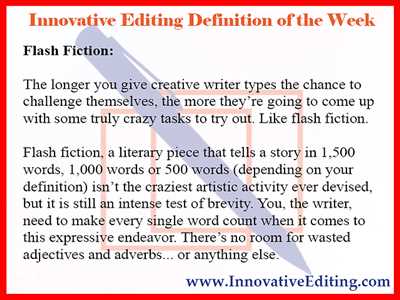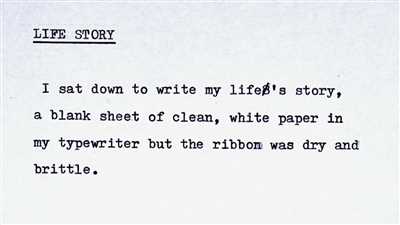
If you have a passion for writing and want to explore a unique form of storytelling, then flash fiction is the perfect avenue for you. Flash fiction, also known as micro fiction, is a form of very short storytelling that usually ranges from 150 to 1500 words. It is a genre that challenges writers to craft short, impactful narratives that leave a lasting impression on readers.
Flash fiction allows writers to experiment with different writing styles and techniques, offering a great opportunity to explore their creativity. In just a few hundred words, writers can create a whole world, establish relatable characters, and tell a compelling story. The brevity of flash fiction makes it a versatile format that can be used to convey various emotions and themes.
To write flash fiction, it’s important to keep a few key considerations in mind. First and foremost, you should focus on maintaining a concise and impactful narrative. Every word counts in flash fiction, so make sure that each sentence serves a purpose and contributes to the overall story. Additionally, it’s crucial to create a strong opening line that hooks the reader and encourages them to keep reading.
Another important aspect of flash fiction is characterization. Since you have limited word count, it’s essential to establish relatable and memorable characters with just a few well-chosen details. Whether it’s through dialogue or internal thoughts, aim to create characters that leave a lasting impression on the reader.
In terms of plot, flash fiction often benefits from a simple and focused storyline. Rather than trying to incorporate multiple subplots, it’s best to stick to one central conflict or idea. This way, you can maintain a sense of cohesiveness and ensure that your story has a clear direction.
Lastly, always seek feedback on your flash fiction. Join writing communities or workshops where you can share your work and receive constructive criticism. Hearing different perspectives will help you grow as a writer and improve your craft.
In conclusion, flash fiction is a creative and challenging form of storytelling that allows writers to create captivating narratives in very limited word counts. By employing concise language, strong characterization, focused plotlines, and seeking feedback, you can master the art of flash fiction and leave a lasting impact on your readers.
How to Write Flash Fiction Short Stories in 1500 Words or Fewer
Flash fiction is a unique form of storytelling that uses a limited word count to create concise and impactful narratives. Typically, flash fiction stories are written in 1500 words or fewer, making them perfect for quick reading or for those who have limited time to dedicate to reading.
When writing flash fiction, it is essential to focus on brevity and precision. Every word counts in a flash fiction story, so be intentional with your language and make every sentence and paragraph serve a specific purpose. By condensing your story into a concise format, you can create a sense of urgency and keep readers engaged from beginning to end.
To write a flash fiction story, start by brainstorming ideas and identifying a central theme or concept. Since the word count is limited, it’s crucial to have a clear focus and avoid unnecessary subplots or excessive description. Choose a single, powerful idea to explore and develop throughout your story.
Next, develop your characters and setting. Although you have limited words to work with, you can still create well-rounded characters and immersive settings through careful selection of details. Focus on the essentials and use descriptive language sparingly to convey the atmosphere and mood of your story.
Structure is crucial in flash fiction. Begin with a strong opening that captivates the reader’s attention and compels them to continue reading. Grab their interest with an intriguing hook or a thought-provoking question that sets the tone for the rest of the story. Remember, you have limited space, so make every sentence count.
In the body of your story, establish tension, conflict, or a problem that the main characters must face. Explore the consequences of their actions or decisions and create a sense of urgency. Since you have limited words, focus on impactful dialogue and concise descriptions to move the plot forward.
As you approach the conclusion, wrap up the story in a satisfying way while leaving room for interpretation or surprise. Consider the emotional impact you want to have on the reader and craft an ending that leaves a lasting impression. A well-executed twist or revelation can make your flash fiction story memorable and thought-provoking.
After writing your flash fiction story, revise and edit it carefully. Make sure every word serves a purpose and that the story flows smoothly within the limited word count. Trim unnecessary details, tighten sentences, and ensure coherence and clarity throughout.
Finally, seek feedback from other writers or readers to gain different perspectives and refine your story further. Welcoming constructive criticism can help you identify areas for improvement and strengthen your storytelling skills.
In conclusion, writing flash fiction short stories in 1500 words or fewer requires a creative and concise approach. By carefully selecting your ideas, developing compelling characters and settings, and structuring your story effectively, you can create impactful narratives that resonate with readers in a brief amount of time.
Prospects
When it comes to writing flash fiction, there are certain prospects that you should keep in mind to ensure your success. The first prospect is understanding your audience. It’s important to analyze their preferences and interests to create flash fiction that will captivate and engage them.
Another prospect to consider is the gateway to your work. Flash fiction is often read on websites or other online platforms, so it’s crucial to have a user-friendly interface and an enjoyable reading experience. By having a well-designed website, you can attract more readers and ensure they stay longer on your site.
In addition, it’s important to note that flash fiction should have unique and creative elements. This means that your stories should always be fresh and original, giving your readers a unique experience they can’t find elsewhere. By providing something different, you can stand out from the crowd and attract a loyal fanbase.
Furthermore, feedback is a valuable prospect in flash fiction. By collecting and analyzing feedback from your readers, you can improve your writing skills and understand what works and what doesn’t. This way, you can continuously enhance your flash fiction stories and provide a better reading experience for your audience.
It’s also worth mentioning that flash fiction can have a high impact on readers in a short amount of time. With fewer words to work with, you have to be creative and concise, making every word count. By mastering this skill, you can ensure that your readers are engaged from the beginning to the end of your stories.
In terms of maintaining and organizing your flash fiction, consider using a per-client basis. By categorizing and indexing your stories on a per-client basis, you can easily track your progress and have a higher level of organization. This will help you stay focused and motivated as you continue to create new flash fiction pieces.
Lastly, always try to aim for a high level of performance in your flash fiction. By constantly challenging yourself and trying new techniques, you can push the boundaries of your creativity and take your writing to the next level. Don’t be afraid to experiment and see what works best for you as a flash fiction writer.
Overall, by keeping these prospects in mind and implementing them into your flash fiction writing, you can create engaging and captivating stories that will leave a lasting impression on your readers.
You want to…
In order to create flash fiction, you want to consider several key elements. First and foremost, it’s important to limit the word count to a specific range, such as 500 to 1500 words. This helps to maintain the concise and impactful nature of flash fiction, allowing you to tell a complete story within a limited space.
Next, you want to focus on creating a captivating opening sentence or paragraph. Flash fiction often relies on a strong hook to draw readers in and establish the tone or theme of the story. Use vivid language and imagery to immediately engage the reader’s attention.
When choosing a topic for your flash fiction, consider exploring universal themes or concepts that can resonate with a wide range of readers. This allows your story to have a broader appeal and increases the likelihood of connecting with and engaging your audience.
In terms of structure, flash fiction can be written in various ways. Some authors prefer a traditional beginning, middle, and end format, while others experiment with nonlinear narratives or unexpected twists. There are no strict rules, so feel free to explore and experiment with different storytelling techniques.
Furthermore, it’s crucial to revise and edit your flash fiction thoroughly. With such a limited word count, every word needs to count. Eliminate any unnecessary details or descriptions and focus on the core elements of your story. This will ensure that each sentence contributes to the overall impact and effectiveness of your flash fiction.
Finally, consider submitting your flash fiction to literary magazines, online platforms, or writing contests. Getting your work published or recognized can provide valuable feedback and exposure, as well as opportunities for future writing endeavors.
Overall, creating flash fiction is a rewarding and challenging endeavor. By focusing on concise storytelling, powerful openings, universal themes, creative structures, meticulous editing, and seeking publication opportunities, you can craft compelling flash fiction that resonates with readers and showcases your writing talent.
Try all these

When it comes to creating flash fiction, there are several techniques and methods you can try to craft compelling and engaging stories. Here are a few suggestions:
1. Random Prompts:
One approach is to use random prompts or inspiration to spark your creativity. You can try using online tools or apps to generate random words, images, or scenarios that you can incorporate into your story.
2. Time Limits:
Set a specific time limit, such as 10 minutes or 30 minutes, to write your flash fiction story. The limited time constraint can help you focus your thoughts and ideas, and can lead to surprising and unique storylines.
3. Character or Object Focus:
Choose a specific character or object as the main focus of your flash fiction story. By centering your story around a particular element, you can create a concise and impactful narrative that resonates with readers.
4. Limit the Word Count:
Flash fiction often has a strict word count limit, usually between 300 and 1500 words. Embrace this limitation and challenge yourself to tell a complete and engaging story within these constraints.
5. Experiment with Structure:
Flash fiction allows for experimentation with narrative structure. Try unconventional approaches, such as non-linear storytelling, multiple perspectives, or fragmented scenes, to add depth and intrigue to your stories.
6. Use Vivid Imagery:
In flash fiction, every word matters. Utilize vivid imagery and sensory details to create a rich and immersive reading experience. Make every word count and evoke powerful emotions in your readers.
7. Edit and Revise:
Just because flash fiction is short doesn’t mean it doesn’t require editing and revision. Polish your story by revising sentence structures, eliminating unnecessary details, and ensuring a strong and impactful ending.
8. Read and Learn:
Read flash fiction stories written by other authors to understand different writing styles, techniques, and approaches. Learning from the works of others can inspire and inform your own writing.
Remember, the key to flash fiction is to make every word count and leave a lasting impression on your readers. So, try out these techniques and explore the diverse possibilities of the flash fiction genre.
About Kathy Fish Our Flash Fiction Judge 2022
Kathy Fish is a well-known and highly respected literary figure in the world of flash fiction. As a judge for our Flash Fiction contest in 2022, Kathy brings a wealth of experience and expertise to the table. With her creative prowess and unique perspective, she will undoubtedly select the most exceptional flash fiction pieces.
Kathy Fish has been writing flash fiction for several years, earning a reputation for her ability to craft powerful stories with limited words. Her work has been featured in numerous prestigious publications and websites, making her a provider of inspiration for aspiring writers.
2022 marks the year where Kathy Fish has graciously consented to lend her expertise as our esteemed judge. Her keen eye and profound understanding of the genre will ensure that only the finest flash fiction pieces are recognized.
Flash fiction is a universal medium that challenges writers to tell a complete story in just a few words. It requires the author to be concise and precise, capturing the reader’s attention in a short span of time. This form of storytelling has gained immense popularity in recent years due to its ability to deliver a meaningful message in a compact and impactful manner.
As a judge, Kathy Fish will review each submission with utmost care and attention to detail. She will maintain a strict judging process, ensuring that every flash fiction piece is evaluated on its unique merits. Her years of experience and love for the craft will guide her decision-making, resulting in a fair and unbiased selection process.
During the judging process, Kathy Fish will take into account various aspects of flash fiction, such as storytelling, character development, and emotional impact. Her goal is to identify flash fiction pieces that effectively engage readers and leave a lasting impression.
Kathy Fish understands the importance and value of feedback for writers. Through her judging process, she aims to provide insightful feedbacks and constructive criticism to all participants, helping them improve their skills and refine their craft.
Lastly, Kathy Fish is a strong supporter of emerging writers and believes in providing them with opportunities to showcase their talent. She encourages all aspiring writers to take part in the Flash Fiction contest and welcomes their unique perspectives and creative voices.
With Kathy Fish as our Flash Fiction Judge in 2022, writers can expect a fair, unbiased, and transparent judging process. Her expertise and dedication to the craft of flash fiction will make this year’s contest an unforgettable experience. Whether you’re a seasoned flash fiction writer or someone new to the genre, don’t miss this chance to showcase your skills and gain valuable recognition.









